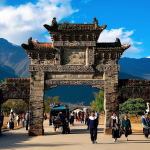《过秦论》原文(上篇)

秦孝公据崤函之固,拥雍州之地,君臣固守以窥周室,有席卷天下,包举宇内,囊括四海之意,并吞八荒之心。当是时也,商君佐之,内立法度,务耕织,修守战之具;外连衡而斗诸侯。于是秦人拱手而取西河之外。
孝公既没,惠文、武、昭襄蒙故业,因遗策,南取汉中,西举巴、蜀,东割膏腴之地,北收要害之郡。诸侯恐惧,会盟而谋弱秦,不爱珍器重宝肥饶之地,以致天下之士,合从缔交,相与为一。当此之时,齐有孟尝,赵有平原,楚有春申,魏有信陵。此四君者,皆明智而忠信,宽厚而爱人,尊贤而重士,约从离衡,兼韩、魏、燕、楚、齐、赵、宋、卫、中山之众。于是六国之士,有宁越、徐尚、苏秦、杜赫之属为之谋,齐明、周最、陈轸、召滑、楼缓、翟景、苏厉、乐毅之徒通其意,吴起、孙膑、带佗、倪良、王廖、田忌、廉颇、赵奢之伦制其兵。尝以十倍之地,百万之众,叩关而攻秦。秦人开关延敌,九国之师,逡巡而不敢进。秦无亡矢遗镞之费,而天下诸侯已困矣。于是从散约败,争割地而赂秦。秦有余力而制其弊,追亡逐北,伏尸百万,流血漂橹;因利乘便,宰割天下,分裂山河。强国请服,弱国入朝。
延及孝文王、庄襄王,享国之日浅,国家无事。
及至始皇,奋六世之余烈,振长策而御宇内,吞二周而亡诸侯,履至尊而制六合,执敲扑而鞭笞天下,威振四海。南取百越之地,以为桂林、象郡;百越之君,俯首系颈,委命下吏。乃使蒙恬北筑长城而守藩篱,却匈奴七百余里;胡人不敢南下而牧马,士不敢弯弓而报怨。于是废先王之道,焚百家之言,以愚黔首;隳名城,杀豪杰;收天下之兵,聚之咸阳,销锋镝,铸以为金人十二,以弱天下之民。然后践华为城,因河为池,据亿丈之城,临不测之渊,以为固。良将劲弩守要害之处,信臣精卒陈利兵而谁何。天下已定,始皇之心,自以为关中之固,金城千里,子孙帝王万世之业也。
始皇既没,余威震于殊俗。然陈涉瓮牖绳枢之子,氓隶之人,而迁徙之徒也;才能不及中人,非有仲尼,墨翟之贤,陶朱、猗顿之富;蹑足行伍之间,而倔起阡陌之中,率疲弊之卒,将数百之众,转而攻秦;斩木为兵,揭竿为旗,天下云集响应,赢粮而景从。山东豪俊遂并起而亡秦族矣。
且夫天下非小弱也,雍州之地,崤函之固,自若也。陈涉之位,非尊于齐、楚、燕、赵、韩、魏、宋、卫、中山之君也;锄櫌棘矜,非铦于钩戟长铩也;谪戍之众,非抗于九国之师也;深谋远虑,行军用兵之道,非及向时之士也。然而成败异变,功业相反,何也?试使山东之国与陈涉度长絜大,比权量力,则不可同年而语矣。然秦以区区之地,致万乘之势,序八州而朝同列,百有余年矣;然后以六合为家,崤函为宫;一夫作难而七庙隳,身死人手,为天下笑者,何也?仁义不施而攻守之势异也。
中文翻译(上篇)
秦孝公占据着崤山和函谷关的险固地势,拥有雍州的土地,君臣牢固地守卫着,借以窥视周王室(的权力),有席卷天下、征服九州、横扫四海的意图和并吞八方荒远之地的雄心。在那时候,(有)商君辅佐他,对内建立法规制度,大兴耕作纺织,修造防守和进攻的器械;对外实行连衡策略,使山东诸侯自相争斗。这样,秦人毫不费力地夺取了西河之外的土地。
孝公死后,惠文王、武王、昭襄王(先后)继承已有的基业,沿袭前代的策略,向南攻取汉中,向西吞并巴、蜀,向东割取肥沃的地盘,向北占领要害的郡邑。诸侯恐慌害怕,开会结盟,谋求削弱秦国的办法。不吝惜奇珍贵重的器物和肥沃富饶的土地,用来招致天下的优秀人才,订立合纵盟约,结成一体。在这个时候,齐国有孟尝君,赵国有平原君,楚国有春申君,魏国有信陵君。这四位封君,都见事明,有智谋,心地诚而讲信义,待人很宽厚,对贤能之士很敬重,(他们)以合纵之约击破秦的连横之策,将韩、魏、燕、楚、齐、赵、宋、卫、中山的部队结成联军。在这时,六国的士人,有宁越、徐尚、苏秦、杜赫等人为他们出谋划策,齐明、周最、陈轸、召滑、楼缓、翟景、苏厉、乐毅等人(为各国)沟通意见,吴起、孙膑、带佗、倪良、王廖、田忌、廉颇、赵奢等人统率他们的军队。他们曾经以十倍于秦的土地,上百万的军队,开往函谷关去攻打秦国。秦人大开关门引敌深入,九国的军队(却)迟疑起来,不敢入关。秦人没有丢失一支箭那样的消耗,天下的诸侯(却)已陷入狼狈不堪的境地了。这样一来,纵约解散了,各诸侯国争着割地来贿赂秦国。秦有富余的力量利用对方弱点来制服他们,追赶(九国的)败兵,百万败兵横尸道路,血流(成河),大盾牌也漂浮得起。(秦人)凭借这有利的形势,割取天下的土地,(重新)划分山河的区域。强国主动表示屈服,弱国入秦朝拜。
待到孝文王、庄襄王依次继位,他们统治的时间不长,秦国没有什么大事。
到始皇的时候,他发展六世遗留下来的功业,以武力来统治各国,将东周、西周和各诸侯国统统消灭,登上皇帝的宝座来统治天下,用严酷的刑罚来奴役天下的百姓,威风震慑四海。向南攻取百越的土地,把它划为桂林郡和象郡,百越的君主低着头,颈上捆着绳子,性命听凭秦的下级官吏处理。于是(又)派蒙恬到北方去修筑长城,守卫边境,击退匈奴七百多里;胡人(再)不敢到南边来放牧,勇士不敢拉弓射箭来报仇。接着就废除古代帝王的治世之道,焚烧诸子百家的著作,来使百姓变得愚蠢;毁坏著名的城邑,杀掉英雄豪杰;收缴天下的兵器,集中在咸阳,销毁兵刃和箭头,用来铸成十二个铜人,来削弱百姓的反抗力量。然后凭着华山当作城,就着黄河当作池护城河,占据着华山以东险固的地势,面对着深不可测的黄河,把这作为坚固的屏障。优秀的将领手执强弩守卫着要害的地方,可靠的官员、精锐的士卒拿着锋利的兵器,盘问过往行人。天下已经安定,始皇心里自以为关中的险固地势,像是千里长的铜铁铸成的城垣,正是子孙万代的帝王基业。
始皇去世之后,他的余威(依然)震慑着边远地区。可是,陈涉不过是个用破瓮做窗户、用草绳系门板的贫家子弟,是下底层一类的人,后来做了被迁谪戍边的兵卒;才能不如平常的人,更没有孔子、墨子那样的贤德,也不像陶朱公、猗顿那样的富有。(他)跻身于戍卒的队伍中,从田野间突然奋起发难,率领着疲惫无力的士兵,指挥着几百人的队伍,掉转头来进攻秦国,砍下树木作武器,举起竹竿当旗帜,天下百姓像云那样聚集,像回声那样应和他,许多人背着粮食,如影随形地跟着。崤山以东的英雄豪杰于是一齐起事,消灭了秦王朝。
况且那天下并没有缩小削弱,雍州的地势,崤山和函谷关的险固,还是从前那个样子。陈涉的地位并不比齐、楚、燕、赵、韩、魏、宋、卫、中山的国君更尊贵;锄头木棍并不比钩戟长矛更锋利;那迁谪戍边的士兵也不能和九国部队抗衡;深谋远虑,行军用兵的策略,(陈涉)也比不上先前九国的武将谋臣。可是条件好者失败而条件差者成功,功业完全相反,为什么呢?假使拿东方诸国跟陈涉比一比长短大小,量一量权势力量,那就不可相提并论了。然而秦凭借着它的小小的地方,发展到兵车万乘的国势,管辖全国,使六国诸侯都来朝见,已经一百多年了;这之后把天下作为家业,用崤山、函谷关作为自己的内宫;一个戍卒发难国家就灭亡了,皇子皇孙都死在人家手里,被天下人耻笑,是什么原因呢?就因为不施行仁义而攻守的形势发生了变化啊。
英文翻译(上篇)
When Duke Xiao of Qin held sway over the strategically located territory of Mount Xia and Hangu Pass, and possessed the land of Yongzhou, he and his ministers firmly defended their domain while keeping an eye on the Zhou royal court. They harbored the ambition of sweeping across the entire land, bringing all under heaven under their control, and annexing the remote regions in all eight directions. At that time, with the assistance of Shang Yang, they implemented laws and regulations internally, vigorously promoted agriculture and sericulture, and manufactured weapons for defense and attack. Externally, they adopted the strategy of "vertical alliance" (hezong) to pit the feudal lords of the eastern states against one another. In this way, the people of Qin easily seized the land west of the Yellow River.
After Duke Xiao's death, King Huiwen, King Wu, and King Zhaoxiang successively inherited the existing state and continued the former policies. They expanded southward to seize the land of Hanzhong, westward to annex Ba and Shu, eastward to occupy the fertile lands, and northward to take control of the strategic fiefs. The feudal lords were terrified and formed alliances to plot against Qin. They spared no precious treasures or fertile lands to recruit talented people from all over the world, forming a vertical alliance and uniting as one. At that time, there were the lords of Qi (Mengchangjun), Zhao (Pingyuanjun), Chu (Chunshenjun), and Wei (Xinlingjun). These four lords were all wise, loyal, kind - hearted, and respectful towards the worthy. They united the forces of Han, Wei, Yan, Chu, Qi, Zhao, Song, Wei, and Zhongshan to resist Qin. At that time, among the scholars of the six states, there were Ning Yue, Xu Shang, Su Qin, Du He, etc., who offered advice and strategies; there were Qi Ming, Zhou Zui, Chen Zhen, Shao Hua, Lou Huan, Zhai Jing, Su Li, Le Yi, etc., who conveyed their intentions; and there were Wu Qi, Sun Bin, Dai Tuo, Ni Liang, Wang Liao, Tian Ji, Lian Po, Zhao She, etc., who commanded the troops. They once launched an attack on Qin with ten times the land area and a million troops. However, when the Qin army opened the gates to welcome the enemy, the allied forces of the nine states hesitated and dared not advance. The Qin army suffered no loss of arrows or crossbow bolts, while the allied forces of the feudal lords were already in a desperate situation. As a result, the vertical alliance fell apart, and the feudal lords vied with each other to cede territory and bribe Qin. With abundant strength, Qin took advantage of the weaknesses of the other states, pursued the defeated enemies, and left millions of corpses on the battlefield, with blood flowing like rivers. The shields of the enemy floated on the water. Seizing the opportunity, Qin occupied the land of all under heaven, divided the mountains and rivers, and made the powerful states submit and the weak states pay homage.
After King Zhaoxiang, King Xiaowen and King Zhuangxiang reigned for a short time, and there were no major events in the state of Qin.
When Emperor Qin Shi Huang ascended the throne, he carried forward the achievements of his six predecessors, wielded his long - handled whip to rule the world, conquered the two Zhou dynasties and the feudal lords, ascended the supreme throne to rule all under heaven, used harsh punishments to enslave the people, and his prestige shook the four seas. He expanded southward to seize the land of Baiyue, established Guilin Prefecture and Xiang Prefecture. The lords of Baiyue bowed their heads, tied their necks with ropes, and entrusted their lives to the lower - level officials of Qin. Then he sent Meng Tian to build the Great Wall in the north to defend the border and repelled the Xiongnu more than seven hundred li away. The Xiongnu people dared not move southward to graze their horses, and the soldiers dared not bend their bows to seek revenge. Subsequently, he abolished the ways of the former kings, burned the books of the various schools of thought, and made the people stupid; he destroyed famous cities, killed heroes and outstanding figures; he collected all the weapons in the world, gathered them in Xianyang, melted the swords and arrowheads, and cast twelve bronze men, in order to weaken the resistance of the people. Then he regarded Mount Hua as a city wall, used the Yellow River as a moat, occupied the land to the east of Mount Hua with its precipitous terrain, and faced the unfathomable Yellow River, regarding it as a solid defense. Excellent generals guarded the strategic points with strong crossbows, and reliable officials and elite soldiers held sharp weapons and questioned the passers - by. When the world was already pacified, Emperor Qin Shi Huang thought in his heart that the precipitous terrain of Guanzhong was like a city wall made of bronze and iron thousands of li long, which would be the eternal imperial foundation for his descendants.
After Emperor Qin Shi Huang's death, his prestige still intimidated the remote regions. However, Chen She, the son of a poor family who used a broken jar for a window and a hemp rope for a door latch, and was a low - ranking person who had been exiled to the border for military service, was not as noble as the lords of Qi, Chu, Yan, Zhao, Han, Wei, Song, Wei, and Zhongshan; his farming tools were not sharper than the hooks, halberds, long spears, and short swords; the exiled soldiers were not a match for the allied forces of the nine states; and in terms of far - reaching strategies and military tactics, he was inferior to the generals and advisers of the former nine states. Nevertheless, the outcome was reversed, and the achievements were contrary. Why? If we compare the length, size, power, and strength of the eastern states with those of Chen She, they are incomparable. However, Qin, starting from a small place, developed into a state with a chariot force of ten thousand and ruled all under heaven, making the six states pay homage for more than a hundred years. Then it regarded all under heaven as its own domain, used Mount Hua and Hangu Pass as its inner palace. A single exiled soldier's uprising led to the destruction of the Qin dynasty, and the imperial children and grandchildren were all killed by others and became the laughingstock of the world. Why? It was because Qin did not practice benevolence and righteousness, and the situation of attack and defense had changed.
背景补充
创作背景
西汉初期,经济凋敝,百废待兴。为了恢复和发展经济,统治者采取了休养生息的政策,轻徭薄赋,与民休息。然而,随着经济的逐渐复苏,一些诸侯国的势力也开始膨胀,对中央政权构成了威胁。同时,社会上也出现了一些对秦朝灭亡原因的讨论和反思。贾谊生活在汉文帝时期,他目睹了当时社会的种种问题,深感有必要对历史进行总结,为统治者提供借鉴。于是,他创作了《过秦论》,旨在通过对秦朝兴衰过程的分析,揭示秦朝灭亡的原因,警示当世统治者要施行仁义,巩固统治。
创作意图
- 总结历史教训:贾谊通过对秦朝从兴起到灭亡全过程的详细叙述和分析,总结了秦朝在政治、军事、外交等方面的经验和教训。他指出秦朝在统一天下后,没有及时调整政策,继续推行严刑峻法,不施仁义,导致失去民心,最终走向灭亡。这一教训对于当时的统治者具有重要的警示意义。
- 为统治者提供借鉴:贾谊希望通过对秦朝灭亡原因的分析,让汉文帝认识到施行仁义的重要性。他认为统治者应该以民为本,关注百姓的疾苦,减轻赋税,宽缓刑罚,这样才能赢得民心,巩固统治。同时,他也提醒统治者要警惕诸侯势力的膨胀,加强中央集权,维护国家的稳定和统一。
- 宣扬自己的政治主张:贾谊是西汉初期著名的政论家和文学家,他有着自己的政治理想和主张。《过秦论》也是他宣扬自己政治主张的重要文章之一。他在文中强调法治与德治相结合,主张通过道德教化和法律约束来治理国家,实现国家的长治久安。
文学影响
- 政论文的经典之作:《过秦论》是一篇具有高度思想性和艺术性的政论文。它结构严谨,逻辑严密,论证充分,气势磅礴。文章开篇点题,然后层层递进,通过对秦朝兴衰过程的详细描述和分析,得出了“仁义不施而攻守之势异也”的结论。这种论证方法和结构安排对后世的政论文写作产生了深远的影响。
- 文学语言的典范:贾谊在文中运用了大量的排比、对偶、夸张等修辞手法,使文章语言生动形象,富有感染力。例如,“席卷天下,包举宇内,囊括四海之意,并吞八荒之心”“追亡逐北,伏尸百万,流血漂橹”等语句,气势恢宏,具有强烈的艺术感染力。这些修辞手法的运用也为后世的文学创作提供了借鉴。
- 历史与文学的完美结合:《过秦论》不仅是一篇优秀的政论文,也是一部具有很高史学价值的历史著作。它通过对秦朝历史的详细叙述和分析,展现了秦朝兴衰的全过程,为后人了解秦朝的历史提供了重要的资料。同时,它又将历史与文学完美结合,使文章既有历史的厚重感,又有文学的艺术美。
历史地位
《过秦论》在中国古代文学史上占有重要的地位。它是西汉初期政论文的代表作之一,对后世的政论文写作产生了深远的影响。同时,它也是中国历史上第一部系统总结秦朝兴衰原因的著作,为后人研究秦朝历史提供了重要的参考。此外,《过秦论》所蕴含的思想和智慧,对于我们今天的社会治理和政治建设仍然具有重要的启示意义。












评论功能已关闭。